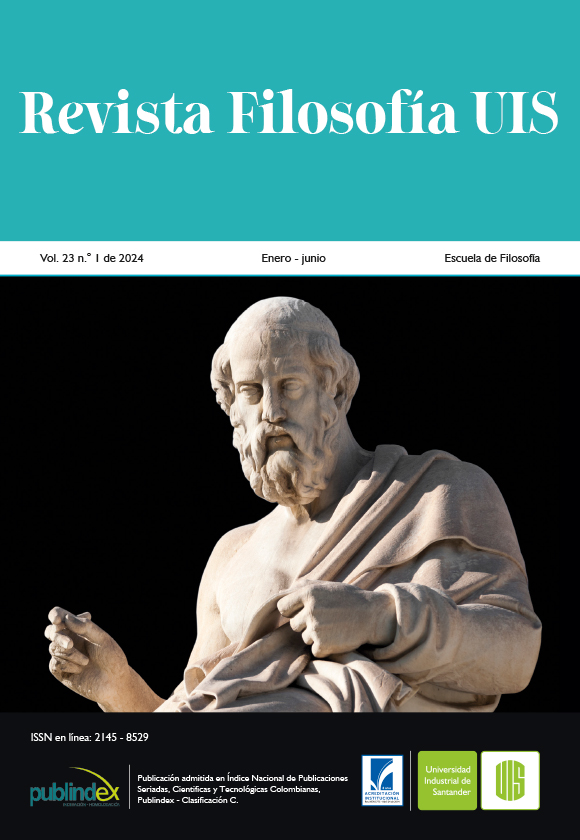Publicado 02-01-2024
Palabras clave
- Teoría jurídica conceptual,
- metodología,
- Análisis conceptual modesto (ACM),
- Análisis conceptual inmodesto (ACI),
- Naturaleza del Derecho
Cómo citar
Derechos de autor 2024 Revista Filosofía UIS

Esta obra está bajo una licencia internacional Creative Commons Atribución 4.0.
Resumen
Este ensayo argumenta que el análisis conceptual inmodesto es epistémicamente inviable para seres como nosotros, porque no tenemos forma de justificar afirmaciones inmodestas acerca de la naturaleza de algo. Como argumento más adelante, las afirmaciones inmodestas no pueden ser justificadas por medios a priori o a posteriori. Si como suponen nuestras prácticas epistemológicas evaluativas tradicionales, no hay otras formas de justificar una creencia, entonces no podemos justificar afirmaciones inmodestas sobre la naturaleza de algo. El análisis conceptual inmodesto es epistemológicamente inviable, entonces, porque nosotros no tenemos una forma confiable de identificar y justificar afirmaciones inmodestas sobre la naturaleza de algo. El ensayo finaliza con una evaluación de las teorías jurídicas de Scott Shapiro y Mark Greenberg desde el punto de vista de una aproximación desde el análisis modesto, por ejemplo, lo que implican nuestras prácticas conceptuales sobre la naturaleza del derecho.
Descargas
Citas
- Béjoint, H. (2000). Modern Lexicography: an Introduction. Oxford University Press.
- Bergenholtz, H. y Gouws Rufus, H. (2012). What is Lexicography? Lexikos, 22(1), 31-42.
- BonJour, L. (1988). The Structure of Empirical Knowledge. Harvard University Press.
- Chalmers, D. (2020). What is Conceptual Engineering and What Should it Be? Inquiry: An Interdisciplinary Journal of Philosophy, 1-17.
- Descartes, R. (1977). Meditaciones metafísicas. Con objeciones y respuestas (V. Peña, trad.). Alfaguara.
- Dworkin, R. (1977). Taking Rights Seriously. Harvard University Press.
- Fitting, M. (2015). Intensional Logic. En E. Zalta (ed.), Stanford Encyclopedia of Philosophy. Stanford University. https://plato.stanford.edu/entries/logic-intensional/
- Frege, G. (1892). Über Sinn und Bedutung. Zeitschrift für Philosophie und philosophische Kritik, 100, 25-50.
- Frege, G. (1997). On Sense and Reference (M. Beaney, trad.). En M. Beaney (Ed.), The Frege Reader. Blackwell.
- Greenberg, M. (2008). How Facts Make Law. En S. Hershovitz (Ed.). Exploring Law’s Empire: The Jurisprudence of Ronald Dworkin (pp. 225-264). Oxford University Press.
- Greenberg, M. (2014). The Moral Impact Theory of Law. Yale Law Journal, 123(5), 1288-1342.
- Hart, H. (1998). El concepto de derecho (G. Carrió, trad.). Abeledo Perrot.
- Himma, K. (2023). Replacement naturalism and the limits of experimental jurisprudence. Jurisprudence, 14(3), 348-373.
- Hume, D. (1975). An Enquiry Concerning Human Understanding. En L.A. Selby-Bigge (Ed.). Clarendon Press.
- Jackson, F. (1998). From Metaphysics to Ethics: A Defence of Conceptual Analysis. Oxford University Press.
- Klein, P. (2005). Infinitism Is the Solution to the Regress Problem. En M. Steup y E. Sosa, E (eds.). Contemporary Debates in Epistemology. Blackwell Publishing.
- Kripke, S. (1972). Naming and Necessity. Harvard University Press.
- Leiter, B. (2007). Naturalizing Jurisprudence. Oxford University Press.
- Merriam-Webster. (2024). Dictionary. Merriam-Webster Inc. https://www.merriam-webster.com/
- Morris, W. E. y Brown, C. R. (2023). David Hume. En E. Zalta (Ed.). Stanford Encyclopedia of Philosophy. Stanford University. https://plato.stanford.edu/entries/hume/
- Oxford English Dictionary. (2015), 7th Ed. Oxford University Press.
- Quine, W. (1951). Two Dogmas of Empiricism. Philosophical Review, 60(1), 20-43.
- Raz, J. (2009). Can There Be a Theory of Law? En J. Raz, Between Authority and Interpretation. Oxford University Press.
- Russell, B. (2020). A priori Justification and Knowledge. En E. Zalta (ed.). Stanford Encyclopedia of Philosophy. Stanford University. https://plato.stanford.edu/entries/apriori/.
- Shapiro, S. (2011). Legality. Harvard University Press.

